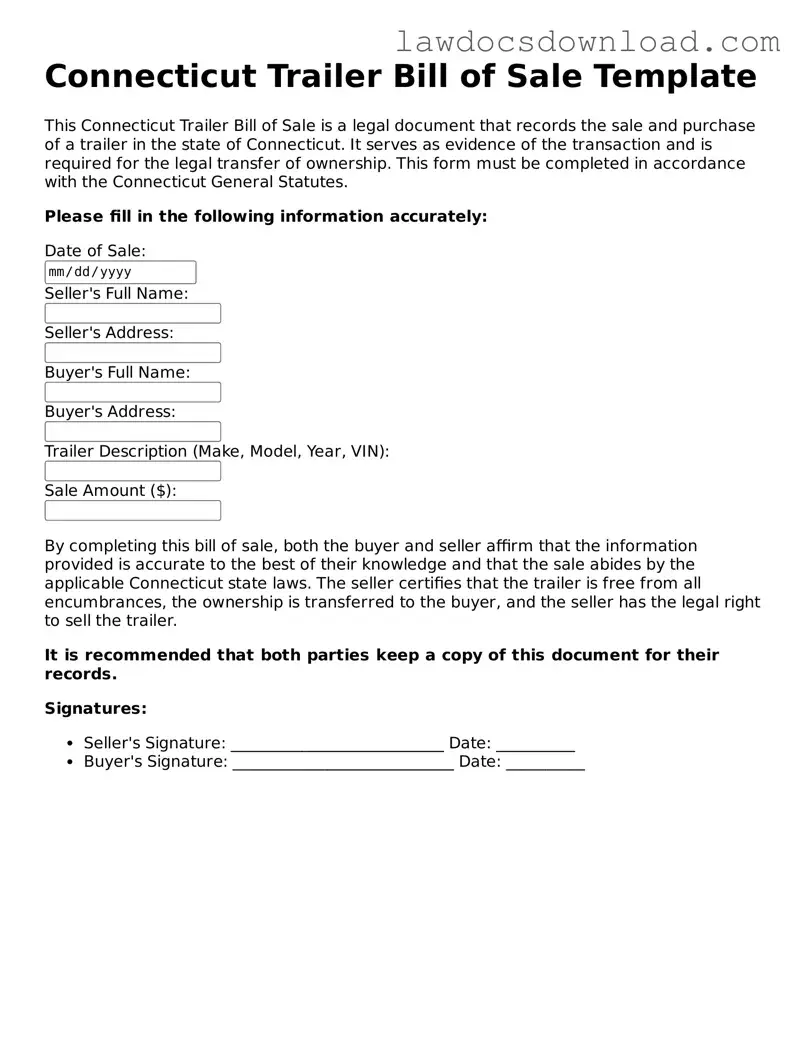The Connecticut Trailer Bill of Sale form shares similarities with the Vehicle Bill of Sale, as both serve the primary purpose of documenting the transfer of ownership from a seller to a buyer. This type of documentation is crucial for the registration process and for legal protection in the event of disputes. They both record essential details such as the make, model, year, and identification number of the item being sold, as well as the sale price and the signatures of both parties involved. These forms act as a receipt for the transaction and are necessary for the new owner to properly register the vehicle or trailer in their name.
Another document comparable to the Connecticut Trailer Bill of Sale is the Boat Bill of Sale. Similar to the trailer bill, the boat bill is a specialized form used to document the sale and purchase of a watercraft. It captures specific details unique to boats, such as hull identification numbers and the type of boat, alongside information about the buyer and seller. Both forms are essential for the registration process with the respective state authorities and help establish the new ownership legally and formally.
The General Bill of Sale is also akin to the Connecticut Trailer Bill of Sale, in that it is used to transfer ownership of personal property from one party to another. However, the General Bill of Sale is more versatile, covering a wide range of personal property, not specifically tailored to trailers, vehicles, or boats. Despite this broader application, it serves the same fundamental purpose: to provide a written record of the sale, including details about the item sold, the sale amount, and the parties' signatures. This documentation is crucial for legal protection and may be required for tax purposes.
The Connecticut Trailer Bill of Sale has similarities with the Motorcycle Bill of Sale. Both documents facilitate the transfer of ownership for specific types of vehicles and require similar information, such as make, model, year, and vehicle identification number (VIN) or equivalent. Both also include details about the sale, including the purchase price and the signatures of the buyer and seller, serving as proof of transaction and ownership for registration purposes.
Comparable to the Connecticut Trailer Bill of Sale is the Firearm Bill of Sale. While focusing on the sale and purchase of firearms, this document, like the trailer bill of sale, collects detailed information regarding the item being sold, alongside the personal details and signatures of both parties involved in the transaction. Both documents play a critical role in establishing a legal record of transfer, which is particularly important given the specific regulatory requirements related to firearms and trailers.
The Livestock Bill of Sale operates similarly to the Connecticut Trailer Bill of Sale by documenting the sale and transfer of ownership of animals, such as horses, cattle, and other farm animals. While it pertains to a different category of property, it also requires detailed descriptions of the property being sold, the terms of the sale, and the identification of both buyer and seller. This documentation is crucial for record-keeping, proof of ownership, and may be required for registration or identification purposes within agricultural or livestock organizations.

